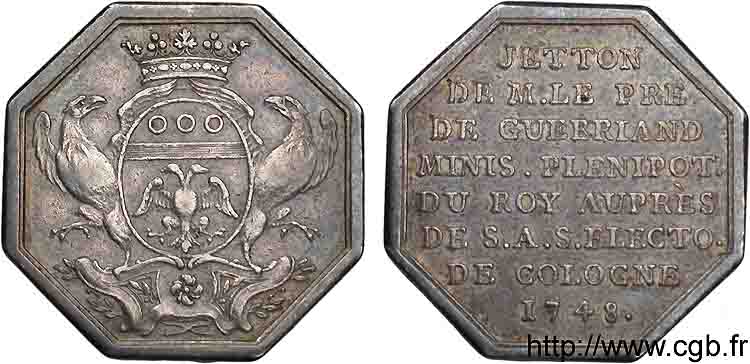v11_1314 - PARIS (LE PARLEMENT DE...) Jeton octogonal AR 32, Jean Bonaventure LELAY 1748
MONNAIES 11 (2002)
Начальная цена : 228.67 €
Назначить цену : 533.57 €
непроданный лот
Начальная цена : 228.67 €
Назначить цену : 533.57 €
непроданный лот
Тип Jeton octogonal AR 32, Jean Bonaventure LELAY
Дата: 1748
Металл: silver
Диаметр: 33 mm
Ориентация осей монеты: 6 h.
Вес: 12,30 g.
Век: lisse
Редкость: R3
Комментарии о состоянии
Ce jeton est recouvert d’une légère patine grise. Les champs présentent de petits chocs
Лицевая сторона
Аверс: описание: Armes de J. Lelay : d’argent à la fasce d’argent accompagnée en chef de 3 annelets de gueules, et en pointe d’une aigle éployée de sable.
Обратная сторона
Реверс: легенда: JETTON / DE M. LE PRE. / DE GUEBRIAND / MINIS. PLENIPOT. / DU ROY AUPRÈS / DE S. A. S. ELECTO. / DE COLOGNE / 1748..
Реверс: Описание: en huit lignes dans le champ.
Комментарий
Semble inédit et non répertorié.








 Cообщить об ошибке
Cообщить об ошибке Распечатать страницу
Распечатать страницу Отправить мой выбор
Отправить мой выбор Задать вопрос
Задать вопрос Consign / sell
Consign / sell